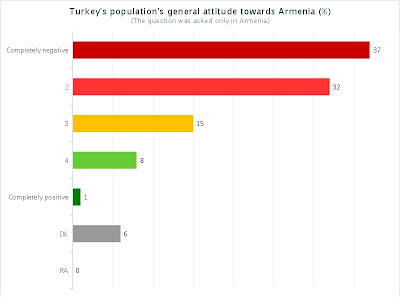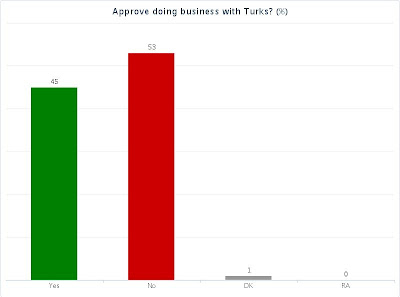Tuesday, May 15, 2012
Public Opinion about Women in Parliament in Georgia
Posted by
Natia
at
11:52 AM
1 comments
![]()
Labels: Georgia, Parliament, Public Opinion, Women
Monday, May 14, 2012
Getting information from the internet – how does it affect Georgians’ views?
Since having access to the internet drastically increases the amount and varies the type of information available to people, the question of political implications naturally follows. As Georgians begin accessing information from online sources, how are their assessments of their governments and others changing?
- Under the present government in Georgia do you completely agree, somewhat agree, somewhat disagree, or completely disagree that people like yourself are treated fairly by the government?
- To what degree does the court system in Georgia treat all citizens equally or to what degree does it favor some over others?
- Would you say that the most recent election was conducted completely fairly, to some extent fairly, or not at all fairly?
- In Georgia today, do you think or not that people like yourself have the right to openly say what they think?
- How well do you think TV journalists in Georgia inform the population about what is actually going on in Georgia?
Posted by
Lucy Flynn
at
10:01 AM
0
comments
![]()
Friday, May 11, 2012
Political Participation and Democracy in Azerbaijan
Posted by
Anonymous
at
9:56 AM
0
comments
![]()
Labels: Attitudes, Azerbaijan, Democracy, Transition
Tuesday, May 01, 2012
Ethnic versus European Identity: The Case of Georgia
Posted by
Natia
at
11:06 AM
0
comments
![]()
Labels: Caucasus, European Union, Georgia, Youth
Thursday, April 12, 2012
Georgian get-togethers: Private Problems versus Politics
Posted by
Natia
at
2:15 PM
0
comments
![]()
Labels: Civic Engagement, Democracy, Georgia, Politics
Friday, March 30, 2012
CB 2011 Preview | Attitudes towards IDPs in Georgia

Posted by
Wesli
at
10:51 AM
0
comments
![]()
Labels: Abkhazia, Internally Displaced Persons, Tskhinvali, UNHCR
Thursday, March 29, 2012
Blood Donation in Georgia: Obstacles and Opportunities
Posted by
Natia
at
4:34 PM
2
comments
![]()
Labels: Caucasus Barometer, Georgia, Public Health, World Health Organization (WHO)
Friday, March 16, 2012
Brookings Event - Internally Displaced Persons and Host Communities: The Limits of Hospitality?
Most of the world's 27 million people who have been internally displaced by conflict do not live in camps; rather they live with family members or friends or are dispersed within communities. One frequently overlooked aspect of displacement is the impact of internally displaced persons (IDPs) on the communities which host them—communities which are often poor and marginalized themselves.
On March 22, the Brookings-LSE Project on Internal Displacement and the International Committee for the Red Cross (ICRC) will host a discussion of two recent reports on IDP and host community relations: "Can You Be an IDP for Twenty Years? A Comparative Field Study on the Protection Needs and Attitudes Toward Displacement Among IDPs and Host Communities in Azerbaijan" and "The Effects of Internal Displacement on Host Communities: A Case Study of Suba and Ciudad Bolívar Localities in Bogotá, Colombia."
The event is at The Brookings Institution, Saul/Zilkha Rooms, 1775 Massachusetts Ave, NW, Washington, DC: Thursday, March 22, 2012, 12:00 — 1:30 pm.
Posted by
HansG
at
4:27 PM
0
comments
![]()
Labels: Azerbaijan, Internally Displaced Persons
Perceptions of Good Citizenship in Georgia
Wednesday, March 14, 2012
Georgia and the EU’s Economic Woes

Posted by
Wesli
at
10:33 AM
0
comments
![]()
Labels: Economy, Employment, Europe, European Union
Georgia Corruption Data | Now Available

"From the case studies, 10 factors emerge that help explain Georgia's achievements to date: exercising strong political will; establishing credibility early; launching a frontal assault; attracting new staff; limiting the state's role; adopting unconventional methods; coordinating closely; tailoring international experience to local conditions; harnessing technology; and using communications strategically. While many of these factors may seem obvious, the comprehensiveness, boldness, pace, and sequencing of the reforms make Georgia's story unique."

Posted by
HansG
at
9:53 AM
0
comments
![]()
Labels: Corruption, Reform
Friday, March 02, 2012
ETF Migration Survey in Armenia | Update
For the last few months, CRRC Armenia has been doing a survey for the European Training Foundation (ETF). This is a major undertaking, with 4.000 respondents, and a specialized sampling procedure (basic details here). We are looking forward to getting the results. Now, the effort has been covered by the ETF website, in an article that shows some of the human dimensions of migration, and its various dimensions.
Within that article, there is a short reference to our ongoing work.
In early March 2012, Heghine Manasyan, the Country Director at CRRC Armenia, will be presenting the preliminary results of that survey at a conference in Turin (program). Keep following the blog, we will let you know once the survey results are available. (Of course, much additional CRRC migration research materials is also available, most of it linked through this blog.)
You find the ETF article here.
Posted by
HansG
at
2:40 PM
0
comments
![]()
Monday, February 27, 2012
Tracking "CRRC" on the Web | Google Alerts
One term that has NOT proven useful in this is "CRRC". As it turns out, a number of organizations use this acronym. There is, for example, the Conflict Records Research Center at the National Defense University, which itself is the center for professional military education in the United States. That CRRC says that its "mission is to facilitate the use of captured records to support research, both within and outside the government."
Next to keeping Saddam Hussein's records, CRRC also serves more basic tasks, such as keeping your roof from getting too hot.
This CRRC says that it "maintains a third-party rating system for radiative properties of roof surfacing materials." It's based in California, and has been rating roofs since 1998. We would like to think that this CRRC also is about numbers. Similarly in California is a CRRC that at first sounds as if it's dedicated to recycling. Actually, it's an association of companies in the waste industry, and, as such associations do, both serves their members with services, and lobbies on their behalf. Started in 1958, it's been around for a while.
And then there's another American association. Austere in its Internet design and logo, it also holds the www.crrc.org address. Since they had that .org domain, we had to get a much longer Web address way back when. Based in New Jersey, the Citizen's Rifle and Revolver Club is the oldest CRRC we could identify, and was started in 1938.
Between centers, councils, clubs and industry associations, we also found a more cuddly version of CRRC, this one in the United Kingdom.
"Our long term Rabbit residents enjoy the freedom of quiet, purpose built, predator proof enclosures to roam as they wish. [...] They have the chance to wash each other, and play, and spend a lot of time in rows next to each other just watching the world go by."That doesn't sound like what we do everyday, but it's a nice group to share the search term "CRRC" with.
Any search terms you try to keep track off? Try Google Alerts by clicking here.
Posted by
HansG
at
11:36 AM
0
comments
![]()
Labels: Internet
Friday, February 24, 2012
ODA Keyword Search
What is less well known, as we realized from questions we received, is that ODA also has a useful keyword search, in case you want to find particular pieces of data. Let's say you are interested in Georgian attitudes to the Chinese:
Select the dataset (1), go to Codebook and Keywords (2), and then enter your word (3). In the screenshot here, you already see the results. Note, as highlighted in pink, that we still have occasional typos (marring). These constitute less than 1% of the questions, but yep, the tool is not perfect yet, and you may want to try out different keywords. If you notice a spelling mistake, please leave a comment below.
At any rate, keyword search should further expand the usability of our Online Data Analysis for you, which is why we wanted to let you know about it. Try it out by clicking here on ODA.
Posted by
HansG
at
12:14 PM
0
comments
![]()
Labels: Data
Wednesday, February 22, 2012
Social Capital in Caucasus Analytical Digest (CAD)
We have previously worked on social capital, and this issue recently was taken up by the Caucasus Anylatical Digest. The issue discusses the concept of social capital and its relevance to the societies of the South Caucasus.
The author of the first article, Leslie Hough, argues that in contrast to previous perceptions that Georgia is a country with high "bonding" social capital and low "bridging" social capital, in-group solidarity and out-group mistrust, there are in fact vibrant forms of bridging social capital in Georgia; the challenge is the institutionalization of these informal forms of social capital and the alignment of the civil society sector with population's existing priorities and habits. The second article, by Jenny Paturyan, formerly with CRRC, focuses on the low level of social trust in Armenia and its effects on voting behavior and emigration, while the last article, by Anar Valiyev, analyses social capital in Azerbaijan, with the author positing that there is a relatively high level of bonding social capital and correspondingly little bridging social capital in the country, which hinders the development of grass-roots democracy and decreases voter turnout in elections.
All three articles draw on CRRC data, and there are a number of tables highlighting the main aspects of social capital. While we know the authors well, and thus almost feel a bit sheepish in recommending their work, the articles do summarize broad research in accessible style, thus well worth reading. Find the articles here.
Posted by
HansG
at
11:48 AM
0
comments
![]()
Labels: Civil Society, Social Capital
Saturday, February 18, 2012
Leaving Thoughts by British Political Officer in Georgia
David Gale, who had served as Political Officer at the British Embassy since 2007, recently wrote down some of his thoughts upon leaving Georgia, after covering a turbulent time. It was refreshing to read a direct and evenhanded take on a number of issues, from a diplomat who has been following events very closely.
One aspect we especially liked in David's reflections is that he repeatedly highlights polling, as a way of understanding the preferences of the Georgian electorate. To read David's thoughts click here.
Posted by
HansG
at
11:45 AM
0
comments
![]()
Labels: Opinion Poll
Wednesday, February 15, 2012
Fatalism and Political Perceptions in Georgia
Posted by
Natia
at
10:58 AM
0
comments
![]()
Labels: Attitudes, Democracy, Georgia, Social Capital
Tuesday, February 14, 2012
BBC on Gender Roles in the Caucasus | CRRC Data
BBC's Damien McGuinness recently did a short report on gender roles in Georgia. The report used some CRRC data. Click here for the audio piece. The segment on Georgia starts at about 4:30, and our data is cited at 5:45.
You find the link to the report, written by Mariam Naskidashvili, itself here.
Posted by
HansG
at
11:44 AM
0
comments
![]()
Monday, February 06, 2012
The French Senate Bill and Armenian Perceptions on Turkey
Posted by
Wesli
at
12:27 PM
0
comments
![]()
Labels: Armenia, Business, Genocide, Perceptions, Turkey








































